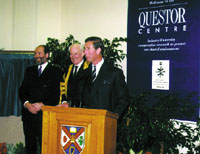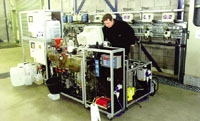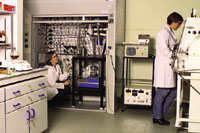
The Queen's University of Belfast, Northern Ireland
A National Science Foundation-linked Industry/University Cooperative Research Center since 1989
Researchers supported by industry partners are looking at the basic science underlying improved methods of effluent treatment, clean technology, life cycle assessment, environmental management systems, computer modelling, land remediation, and environmental communications

|
Centre Mission and Rationale
The QUESTOR Centre is an industry/university co-operative research centre carrying out fundamental and strategic, integrated, multidisciplinary scientific research in selected critical aspects of environmental science and technology. The research programmes seek to provide understanding aimed at finding cost-effective solutions to environmental problems allied to encouraging industrial endeavour and minimising environmental impacts.
Results of the Centre's research should:
- Help to set the agenda for research into the basic science and engineering underlying effluent treatment processes and clean technologies, thereby leading to more environmentally friendly production
- Improve technology transfer between the University and the industrial members
- Identify and train promising post-graduates and post-doctoral scientists and engineers for employment in industry.

|
Research Programme
The Centre's research programme is interdisciplinary. Research projects are carried out in the Schools of Agricultural Chemistry, Chemical Engineering, Chemistry, Civil Engineering, Computer Science, Microbiology, and Psychology. Academic staff in the various departments supervise research carried out by the post-graduate students and post-doctoral staff.
The main focus of the research programme is on techniques for effluent clean-up and clean technology. Research on the application of life cycle analysis to environmental management systems is also being undertaken, as are studies on the defects in environmental communications between experts and the public. A wide range of projects are being funded in the Centre's main research areas-
- Adsorption. Studies are under way on the effectiveness of natural materials for the removal of heavy metals and organics such as dyes and pesticides. Initial results on the effectiveness of these low-cost materials are promising.
- Clean Technology. Research is under way for clean organic, inorganic, and microbial synthesis to minimise pollution arising from waste products.
- Communications. Methods are being sought to detect and repair the breakdown in communications between the expert and the layman on environmental issues.
- Flocculation. Research here concentrates on understanding the mechanism of formation of flocs using aluminum, iron, and mixed iron/aluminum reagents. Work is being carried out on a portable pilot plant flocculation system and the application of neural network technology to the control of the process.
- Life Cycle Assessment. Applications of life cycle analysis to environmental management and to design for the environment is ongoing.
- Microbial Degradation. Research into the biochemistry, genetics, and physiology of anaerobic microorganisms such as Rhodococcus is under way. Degradation of chlorinated alkanes, polycyclic aromatics, and compounds with the carbon-phosphorus bond is being studied by two groups.
- Modelling. An active research group is undertaking work on modelling the dispersion of pollutants in the environment with a recent research focus on odours.
- Site Remediation. The application of Isotope Ratio Mass Spectrometry to the understanding of site remediation processes is ongoing.

|
Special Features
The QUESTOR Centre was the first environmental centre outside the United States to use the National Science Foundation (NSF) model for industry/university co-operative research. As a non-U.S. centre, QUESTOR is unique in having an NSF Centre Evaluator.
The Centre funds a mix of post-graduates working towards PhDs and post-docs carrying out research. This mix is very valuable to the students, who learn from the post-docs. In addition, it is found that a PhD carried out in collaboration with industry, with well-defined goals to be met, is a highly valuable training model and better prepares the student to enter industry.
International links are very important. Joint research is being carried out with the Hazardous Substance Management Research Center in New Jersey, the Centre for Biosurfaces in SUNY at Buffalo, and the Centres for Environmentally Benign Semiconductor Manufacturing, Microcontamination Control, and Water Quality in the University of Arizona at Tucson. Links are in place with the Institute for the Biochemistry and Physiology of Microorganisms at Pushchino, Russia, in addition to RECORD in France and a formative Centre in Bangkok, Thailand.
The existence of the Centre has greatly increased the interactions between the University and industry, as well as between University staff working in different disciplines. It has also brought into the University state-of-the-art equipment that would not otherwise be available. This means that students can gain experience with modern equipment before leaving the University. The Centre has the first tandem mass spectrometer in Ireland, the first ICP-mass spectrometer in Northern Ireland, and the first Isotope Ratio Mass Spectrometer in Ireland. Other equipment includes a high-resolution mass spectrometer, a porosimeter, a capillary zone electrophoresis instrument, low and room temperature thermal analysers, an ion chromatograph, HPLCs, a GC-FTIR, a DNA-sequencer, computer-controlled fermentation vessels, and an eye mark camera.
Pump-priming funding for the QUESTOR Centre came from the International Fund for Ireland, administered along the lines of an NSF Centre grant by the Northern Ireland Industrial Research and Technology Unit. Additional funding came from the European Community STRIDE programme for developing the infrastructure for R&D in Northern Ireland. The Centre received #2.74m from the European Union-funded TDP programme, the successor to the STRIDE programme. This funding built the clean technology side of the research programme and also installed a major demonstration facility that is used to show current remediation and clean technologies to members and also industry in general throughout Ireland. In addition, the International Fund for Ireland made a further grant of #1.06m to the Centre to develop an outreach programme to facilitate environmental technology transfer to industry throughout Ireland, paying particular attention to small and medium- sized enterprises. Industry contributions to the Centre come from its members, which range from manufacturers of pharmaceuticals, chemicals, instruments, textiles, and beverages through suppliers of electricity and water. The Department of the Environment for Northern Ireland and the Environment Agency for England and Wales are also members.
The Centre was awarded a gold medal in the prestigious UK-wide competition, "The Queen's Anniversary Prizes for Higher and Further Education 1996" and the new TDP-funded facilities were officially opened in May 1997 by His Royal Highness, The Prince of Wales.
In addition to the biannual Industry Advisory Board meetings, regular workshops between the QUESTOR academics and industry members are held to define the research strategy of the Centre.
Finally, ionic liquid research in the Clean Technology area expanded so rapidly that it was spun off in April 1999 into a new interdisciplinary IUCRC called QUILL (Queen's University Ionic Liquid Laboratories) with a membership of 20 companies located in the UK, the United States, South Africa, Germany, Holland, Switzerland, Canada, and the Republic of Ireland. Prof. Jim Swindall, Director of QUESTOR, is also a Director of the new Centre, which draws on the expertise in the Schools of Chemical Engineering and Chemistry in Queen's.
Center Headquarters
The QUESTOR Centre
The Queen's University of Belfast
David Keir Building
Stranmillis Road
Belfast BT9 5AG Northern Ireland
Tel +44 (0) 8707 335577 Sum Fax +44 (0) 8707 335578
Homepage: questor.qub.ac.uk
Centre Director: Prof. Jim Swindall
j.swindall@qub.ac.uk
Centre Evaluator: Dr. S. George Walters
(910) 329-0663 * s.george.walters@worldnet.att.net
NSF 01-168gg